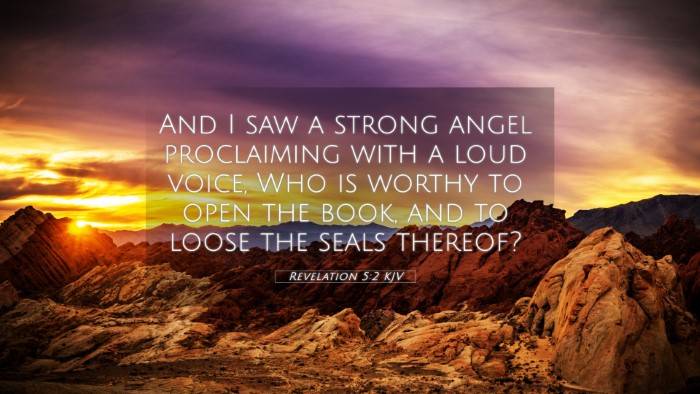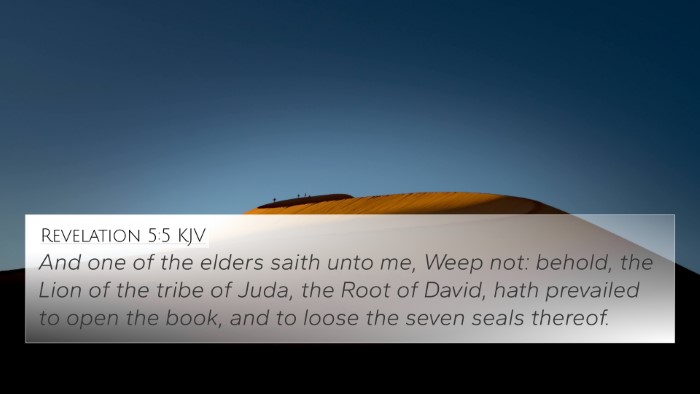Understanding Revelation 5:2
Bible Verse: Revelation 5:2 - "And I saw a strong angel proclaiming with a loud voice, 'Who is worthy to open the scroll and to loose its seals?'
Summary of Meaning
In Revelation 5:2, a strong angel raises a crucial question regarding the worthiness to open a scroll that is sealed. This scroll symbolizes God’s plan and purpose, which is hidden and sealed until someone worthy is found to reveal its contents. The worthiness mentioned here highlights a central theme in Christian eschatology about the qualifications needed to execute God's judgment and the establishment of His kingdom.
Commentary Insights
Matthew Henry's Commentary
Matthew Henry comments on this passage by emphasizing the significance of the scroll. He notes that this scroll likely represents the "book of God's decrees" containing all historical events and decisions made by God. The question posed by the angel underscores the need for someone who possesses the qualifications necessary to execute these divine plans, which reflects Christ's ultimate authority as the Redeemer.
Albert Barnes' Notes
Albert Barnes expands on the idea of worthiness by stating that the one capable of opening the scroll is one who has triumphed over sin and death. Barnes reflects on the authority given to Christ, who alone has the power to unveil God's plan for humanity and usher in the final judgment. The urgency of the angel's proclamation indicates the importance of finding someone worthy, which sets the stage for the revelation of Christ's authority.
Adam Clarke's Commentary
Adam Clarke provides a detailed analysis of the symbolism of the strong angel. He notes that the loud proclamation signifies the seriousness of the question, drawing the attention of all present. Clarke points out that this scene captures the interest of heaven and earth, as it represents the pivotal moment where divine purposes will unfold through the actions of the chosen one capable of opening the seals.
Relational Bible Cross-References
Several Bible verses connect to Revelation 5:2, providing a broader understanding of its implications:
- Revelation 5:5: Introduces the Lion of the tribe of Judah as the worthiness of the scroll.
- Isaiah 53:3-5: Prophesizes the suffering servant's qualifications through suffering and sacrifice.
- Daniel 7:13-14: Discusses one like the Son of Man receiving authority, glory, and sovereign power.
- John 1:29: Identifies Jesus as the Lamb of God who takes away the sin of the world.
- Hebrews 2:14: States that Christ partook of flesh and blood to defeat the devil and death.
- Matthew 28:18: Declares that all authority in heaven and on earth has been given to Jesus.
- Philippians 2:9-11: Asserts that God has exalted Jesus and given Him the name above all names.
- Luke 4:18: Indicates Jesus's mission to bring good news, healing, and freedom.
Inter-Biblical Dialogue
This verse opens a dialogue between the Old and New Testaments, illustrating how the ministry of Christ fulfills Old Testament prophecies and expectations about the Messiah. The questioning of worthiness sharply inspires connections between themes of sacrifice, authority, and redemption that run throughout scripture.
Thematic Connections
Revelation 5:2 not only sets the stage for the unraveling of divine plans but also resonates with various themes found throughout the scriptures:
- Worthy to Judge: Reflects Christ's qualifications to judge humanity.
- Prophetic Fulfillment: Connects to prophetic scriptures about the coming Messiah.
- Unsealing Divine Will: Represents the process by which God's hidden decrees are made known.
- Authority and Power: Highlights the sovereignty bestowed upon Christ following His resurrection.
Conclusion
Revelation 5:2 serves not only as a point of inquiry but also as a profound invitation for believers to explore the themes of worthiness, authority of Christ, and the unfolding of God's divine plan as illustrated through scripture. By connecting this verse with others across the Bible, one gains deeper insight into its significance and implications for both individual faith and collective understanding.








